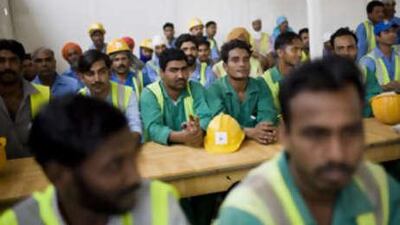ABU DHABI // Doctors tackling up to 20 cases of heat exhaustion a day fear some construction companies are defying the summer midday break rule, which forbids outdoor work between 12.30pm and 3pm. The Kuwait Hospital in Sharjah has received between 15 and 20 cases every working day since the start of this year's ban on July 1, say doctors. One man is currently fighting for his life. Most of the cases were brought in during the break hours, said Dr Ahmed Hussein al Zarouni, the director of the hospital.
"We now have up to three workers in the intensive care unit," he said. "One worker has been there for three days now and his condition is worsening. We don't know if he will make it to another day." A spokesman for Sheikh Khalifa Medical City in Abu Dhabi said its figures for July were not yet available. Dr Zarouni said any direct exposure to sunlight between 10am and 4pm puts workers at risk, but the afternoon sun is at its harshest. He said the symptoms of heat exhaustion include red, hot and dry skin, with an absence of sweating, accompanied by a strong, rapid pulse, throbbing headache, dizziness, nausea and confusion, leading ultimately to loss of consciousness, organ failure, brain damage and even death.
An official from the Ministry of Labour in Sharjah declined to comment, saying only the ministry in Abu Dhabi was authorised to respond. Mohsen al Nessi, manager of the inspection department at the Ministry of Labour, said the number of companies found complying with the rule, now in its fourth year, was at its highest. "During the first year, 75 per cent of the companies were found abiding, while this year the rate went up to 99 per cent," he said.
However, ministry officials said in the three weeks since the midday break began on July 1, they had found 37 companies violating the rule in Abu Dhabi, 30 in Al Ain, two on Dalma Island and six in Al Gharbia. Last year, 617 companies had been caught by the end of the two-month ban. The midday break continues until the end of August. Between July 1 and July 22, officials carried out 11,100 inspections at construction sites in the capital, 1,451 in Al Ain, 34 on Dalma and 96 in Al Gharbia.
In Abu Dhabi, 99 per cent of the companies inspected were said to be complying with the rule, 98 per cent in Al Ain, 94 per cent in Dalma and 93 per cent in Al Gharbia. This year, 60 inspectors accompanied by volunteers from the UAE Red Crescent have visited numerous sites to teach companies and workers alike about the dangers of heat exhaustion and how to avoid it. Brochures and flyers with safety tips in seven languages have also been distributed and a total of 586 awareness seminars have been staged in Abu Dhabi, 335 in Al Ain, five on Dalma and 10 in Al Gharbia.
Companies found breaking the law face a range of fines. "The first year the decision was implemented, violating companies were not fined, but now in its fourth year, all companies have become familiar with the midday break," said Mr Nessi. For a first offence, companies can be fined Dh10,000 (US$2,700) and have some of their activities suspended for three months. They would be listed as a "Category C" company on a ministry schedule, which ranks firms A, B, or C, based on their performance in several categories.
Second-time violators face suspension of work licences for at least six months and a fine of Dh20,000. Third-time violators could have their licence suspended for one year and be fined Dh30,000. At an inspection yesterday, officials praised the regime in place on a building site near Muroor Road in Abu Dhabi, where a safety officer ensured that managers had access to first-aid kits and workers were given plenty of drinking water throughout the day and oral re-hydration solutions to drink every morning.


